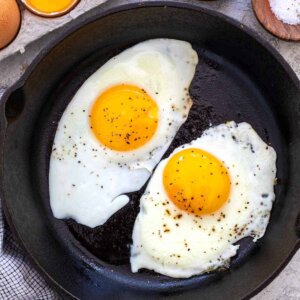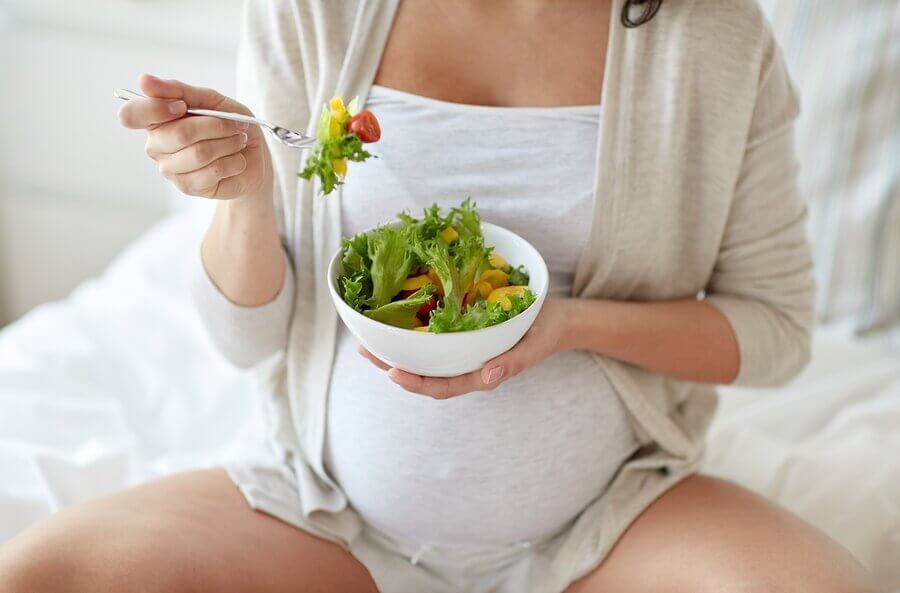Vitamin E and Fertility

Diet is one of the main factors that can affect fertility in both women and men. In fact, studies show that if you want to avoid problems related to conception, it’s essential to consume enough folic acid, B12, calcium, iron, zinc, selenium iodine, and vitamins A, C, D, and E. In today’s article, we’re going to focus on vitamin E and fertility.
This vitamin, also known as tocopherol, is considered to be the fertilization vitamin. Let’s find out why!
Vitamin E and fertility
One of the main functions of vitamin E is that it acts as an antioxidant. Therefore, it works to prevent or reduce the cellular oxidative process and the damage that free radicals cause.

But what does this have to do with fertility? This antioxidant function improves the quality and quantity of sperm, as well as their mobility, concentration, and morphology. Therefore, it’s an ideal vitamin for men because it increase their chances of natural conception.
In addition, according to a group of researchers from Alfonso X El Sabio University and the Complutense University of Madrid, vitamin E is also important for fertility in women. That’s because it helps with the implantation of the fertilized ovum and it’s necessary for the correct development and function of the placenta.
Therefore, vitamin E is essential for the proper functioning of the hormonal system and the reproductive system. As a result, doctors recommend consuming it to improve both male and female fertility.
Foods that contain this vitamin
Vitamin E is a fat-soluble vitamin that’s found in the following foods:
- Vegetable oils, such as sunflower oil, olive oil, corn oil, soybean oil, and wheat germ oil.
- Nuts, such as almonds, hazelnuts, walnuts, pine nuts, peanuts, and pistachios.
- Seeds, such as sunflower seeds, chia seeds, and pumpkin seeds.
- Vegetable greens, such as spinach, broccoli and turnip greens.
- Fresh fruits, such as avocado, plums, apricot, kiwi, coconut, and papaya.
- Egg yolks.
- Butter and margarine.
- Rice.
You should include these foods in a healthy and balanced diet. In addition, you should combine them with moderate physical activity. This is essential for improving fertility in a couple.
However, if you’ve decided to start taking a vitamin E supplement, you should talk to your doctor or nutritionist first. That’s because high levels of this vitamin can increase your risk of suffering from a brain hemorrhage.

Other benefits of vitamin E
As you’ve already seen, vitamin E is a nutrient that influences both male and female fertility. However, it has even more benefits, such as:
- Keeps your immune system strong against viruses and bacteria.
- Forms red blood cells.
- Helps vitamin K function more effectively.
- Dilates blood vessels and prevents blood clots in them.
Conclusion
If you’re trying to get pregnant, you should be following a healthy diet (that includes vitamin E), and exercising. Those are key factors that you can control and improve upon. Just as the German philosopher and anthropologist Ludwig Feuerbach once said, “We are what we eat.”
After all, food is what makes us healthy. And, being healthy is incredibly important if you’re planning to bring a child into the world.
Diet is one of the main factors that can affect fertility in both women and men. In fact, studies show that if you want to avoid problems related to conception, it’s essential to consume enough folic acid, B12, calcium, iron, zinc, selenium iodine, and vitamins A, C, D, and E. In today’s article, we’re going to focus on vitamin E and fertility.
This vitamin, also known as tocopherol, is considered to be the fertilization vitamin. Let’s find out why!
Vitamin E and fertility
One of the main functions of vitamin E is that it acts as an antioxidant. Therefore, it works to prevent or reduce the cellular oxidative process and the damage that free radicals cause.

But what does this have to do with fertility? This antioxidant function improves the quality and quantity of sperm, as well as their mobility, concentration, and morphology. Therefore, it’s an ideal vitamin for men because it increase their chances of natural conception.
In addition, according to a group of researchers from Alfonso X El Sabio University and the Complutense University of Madrid, vitamin E is also important for fertility in women. That’s because it helps with the implantation of the fertilized ovum and it’s necessary for the correct development and function of the placenta.
Therefore, vitamin E is essential for the proper functioning of the hormonal system and the reproductive system. As a result, doctors recommend consuming it to improve both male and female fertility.
Foods that contain this vitamin
Vitamin E is a fat-soluble vitamin that’s found in the following foods:
- Vegetable oils, such as sunflower oil, olive oil, corn oil, soybean oil, and wheat germ oil.
- Nuts, such as almonds, hazelnuts, walnuts, pine nuts, peanuts, and pistachios.
- Seeds, such as sunflower seeds, chia seeds, and pumpkin seeds.
- Vegetable greens, such as spinach, broccoli and turnip greens.
- Fresh fruits, such as avocado, plums, apricot, kiwi, coconut, and papaya.
- Egg yolks.
- Butter and margarine.
- Rice.
You should include these foods in a healthy and balanced diet. In addition, you should combine them with moderate physical activity. This is essential for improving fertility in a couple.
However, if you’ve decided to start taking a vitamin E supplement, you should talk to your doctor or nutritionist first. That’s because high levels of this vitamin can increase your risk of suffering from a brain hemorrhage.

Other benefits of vitamin E
As you’ve already seen, vitamin E is a nutrient that influences both male and female fertility. However, it has even more benefits, such as:
- Keeps your immune system strong against viruses and bacteria.
- Forms red blood cells.
- Helps vitamin K function more effectively.
- Dilates blood vessels and prevents blood clots in them.
Conclusion
If you’re trying to get pregnant, you should be following a healthy diet (that includes vitamin E), and exercising. Those are key factors that you can control and improve upon. Just as the German philosopher and anthropologist Ludwig Feuerbach once said, “We are what we eat.”
After all, food is what makes us healthy. And, being healthy is incredibly important if you’re planning to bring a child into the world.
All cited sources were thoroughly reviewed by our team to ensure their quality, reliability, currency, and validity. The bibliography of this article was considered reliable and of academic or scientific accuracy.
- González-Rodríguez, L. G., López-Sobaler, A. M., Perea Sánchez, J. M. y Ortega, R. M. (2018). Nutrición y fertilidad. Nutricion hospitalaria, 35.
This text is provided for informational purposes only and does not replace consultation with a professional. If in doubt, consult your specialist.








